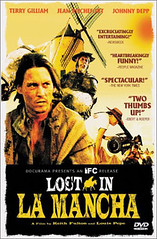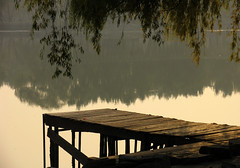They've been threatening to show The Two Towers on HBO again; for some reason, my friends and I follow the HBO schedules in our own way. Collectively, we own all the collector's sets of the Lord of the Rings trilogy; so we decided to make an evening of epic cinema in the living room of one of my friends, where his family has built, I swear, a small theater. We created a bag of Original Butter Flavor that turneby pressing a buttoon that turned a flat pouch into a bag of steaming buttery munchies (one of the few instances when the microwave produces better results than traditional cookery), and settled down to watch the trilogy in THX, Dolby, 7.1 sound.
One of the interesting problems that arise when you have an international collection of friends who have each lived all over the world is that there is PAL and NTSC; there are regions 1 to 7; and there are DVD players that refuse to play discs from the same country of original: this is what can only be called technological xenophobia. My friend actually had three DVD players, one of which, he promised was a 'DVD-slut' that would accept anything thrust into it. As it turned out, the collector's version of Fellowship of the Ring was unplayable, so we settled for the abridged version; my Le Retour du Roi would only play in French.
Interesting experience it was, to watch the culmination of the story (and the best of the films, if you want to take them individually) in French. First of all, one doesn't at first realize how vital the dialogue is to what most would classify as an action movie. For those like myself who could remember the English and understand the French, it served to keep my attention from following the story to staying at the level of the surface; specifically, the text of the dialogue (pace Derrida et al., si vous voulez). One admires the poetry of the dialogue, both in English and in the French; and I have to confess to a feeling of vindication/retribution for years of trying to read French novels or watch subtitled French films: ha, the tables were turned for once.
I have a friend who is a translation scholar; he pointed out that when the committee in Sweden gave Gabriel Garcia Marquez the Nobel prize for literature, were they giving it to his novels, or the translations. And as for Milan Kundera, I can't stand his early works, but everything from La Lenteur onwards I adore: this was the point when he started writing in French rather than in his native Czech.
One of the impetus for writing The Lord of the Rings for JRR Tolkien was actually his interest in languages, especially his make-believe ones that stemmed from his interest in early forms of English; Middle-Earth was born from its tongues, so to speak. I think they should, like Mel Gibson's The Passion of the Christ (filmed in Aramaic) or Philip Glass's Akhnaten (libretto in Ancient Egyptian) have filmed Le Seigneur des Anneaux (I remember trying to buy a ticket, in halting French, for the Lord of the Lambs) in the original tongues: V.O. for the world; subtitled variously, and, for heaven's sake, playable on all machines. The standards of video are so multifarious as it is; adding artificial restrictions is just downright silly.
The karaoke experience (PDF download)






